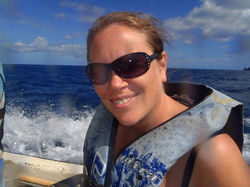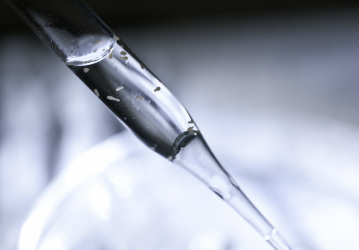Photo credit: A. Wood
Research

My research focuses on understanding the chemically-mediated roles that microbes play in the ecology of benthic marine organisms and how these interactions are impacted by climate change and other environmental stressors.

My current research interests include:
Production of biomolecules by marine bacteria and their roles in mediating ecological interactions between higher organisms
Bacteria are prolific producers of bioactive compounds and, due technological advances, are becoming increasingly recognized as the true producers of compounds that were previously attributed to host organisms. It has long been thought that many coral and other invertebrate larvae settle in response to chemical cues produced by crustose coralline algae (CCA). As part of a collaboration between the Smithsonian Marine Station, Eckerd College, and Mote Marine Lab, I have recently discovered that a bacterium living on the surfaces of CCA produces the compound tetrabromopyrrole (TBP) that induces settlement in multiple coral species. The widespread activity of this compound among multiple coral species indicates that it may be an important factor in the reproductive cycle of many corals and makes this work particularly important for coral reef conservation. I am currently working to understand the prevalence of TBP on marine surfaces and to examine other ecological roles for this compound.
Effects of climate change/environmental stress on the production of ecologically important biomolecules
Coastal ecosystems are facing a number of environmental stressors including rising seawater temperatures, ocean acidification, and excess nutrients. These changes in the environment can impact the physiological processes of marine plants and micro-organisms causing changes in the amounts or types of bioactive compounds produced. Several of my recent projects have involved research aimed at understanding effects of increased seawater temperature and ocean acidification on coral reef organisms including crustose coralline algae and microbial communities and the impacts of these effects on coral recruitment and health.
Production of biomolecules by marine bacteria and their roles in mediating ecological interactions between higher organisms
Bacteria are prolific producers of bioactive compounds and, due technological advances, are becoming increasingly recognized as the true producers of compounds that were previously attributed to host organisms. It has long been thought that many coral and other invertebrate larvae settle in response to chemical cues produced by crustose coralline algae (CCA). As part of a collaboration between the Smithsonian Marine Station, Eckerd College, and Mote Marine Lab, I have recently discovered that a bacterium living on the surfaces of CCA produces the compound tetrabromopyrrole (TBP) that induces settlement in multiple coral species. The widespread activity of this compound among multiple coral species indicates that it may be an important factor in the reproductive cycle of many corals and makes this work particularly important for coral reef conservation. I am currently working to understand the prevalence of TBP on marine surfaces and to examine other ecological roles for this compound.
Effects of climate change/environmental stress on the production of ecologically important biomolecules
Coastal ecosystems are facing a number of environmental stressors including rising seawater temperatures, ocean acidification, and excess nutrients. These changes in the environment can impact the physiological processes of marine plants and micro-organisms causing changes in the amounts or types of bioactive compounds produced. Several of my recent projects have involved research aimed at understanding effects of increased seawater temperature and ocean acidification on coral reef organisms including crustose coralline algae and microbial communities and the impacts of these effects on coral recruitment and health.
Photo credit: R. Ritson-Williams

